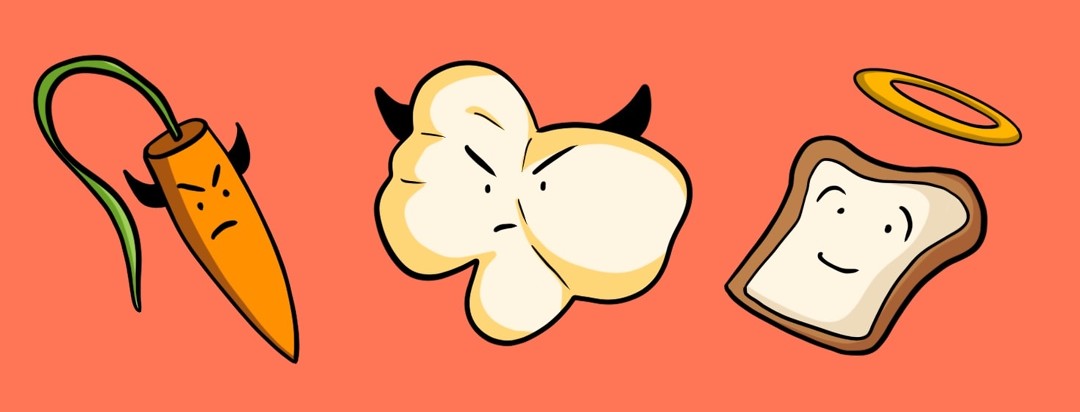Helpful & Hated Foods
Food and diet are tricky when it comes to IBD, as everyone experiences things differently. It can all be very confusing. We were curious to find out the different foods that either help or hurt our advocates. We asked them:
Do certain foods make your IBD symptoms better or worse? Do you avoid any foods because of this?
Natalie:
Luckily, food hasn't seemed to be much of a trigger for me in my more than 13 years taking on Crohn's. I stay away from eating popcorn, nuts, diet pop, beer, and seeds. I try to limit my dairy and caffeine intake on a daily basis, as sometimes I've noticed that can send me to the bathroom more throughout the day. If I'm flaring, I avoid roughage--meaning no raw fruits or veggies.
Brooke:
I currently live with a J-pouch and so food is very important. When I don’t eat enough, it can actually make me nauseous and I get small cramps. However, for me, there are certain foods that some with IBD can eat that I cannot. Whole wheat/oats & corn are absolute no no’s at all times. The wheat speeds up my motility and things like oats & corn get stuck. I love green veggies, but I can only do small amounts of greens and root veggies. I also can only do small amounts of dairy & raw veggies & fruit before it becomes overwhelming. I have found that pressed juices work well for me. And blanched veggies work very well!
Jenna:
I don't eat gluten or dairy. I struggle with fatty, greasy foods too. Fish, chicken, rice, and potatoes are my friend.
Amanda:
For the first few years after being diagnosed with Crohn's disease, I found that my safe foods were basically white carbs such as bread, crackers, potatoes, pasta. I clung to these items especially when my health was very poor. I could at least rely on getting through a meal without vomiting or bolting to the bathroom. Unfortunately, these were unhealthy and I struggled with my weight when I started to find symptomatic remission. During the times I am symptomatic, things like raw vegetables, certain fruits, and roughage like lettuce is difficult and if I eat them, it's only in small doses. I've been so lucky and grateful that over the last eight months, I've been able to slowly bring some of these things back into my diet periodically. The thing that terrifies me and I won't consume, regardless of my disease activity is popcorn :( Too many horrific experiences.
Jamie:
Food is not a symptom trigger for me and I don't have to avoid anything specific for this purpose. However, when I avoid a type of food, it is because I have some symptoms of inflammation going on and know from past experiences that these types of food haven't passed easily or painlessly through my digestive tract. When I avoid specific food, the goal always is to avoid an obstruction.
Marisa:
Since I was diagnosed with IBD 18 years ago, I have always had “safe foods.” Candy and certain soups were always my go to when I wasn’t feeling well. Because I have had so many abdominal surgeries, I am extremely prone to blockages. Therefore, I avoid vegetables, salads, and most fruits. I despise how much IBD has impacted my eating habits but I also know I need to make these sacrifices in order to have the best quality of life possible.
Kelly:
I write a lot about the stigma of eating with IBD. Because, as patients, WE know that IBD differs drastically from patient to patient. What my IBD looks like and what I consume is completely different than another patients experiences with what symptoms they experience and what they are able to eat. A lot of us do have similar foods we cannot eat, like raw fruits and veggies, nuts, popcorn.. some of the foods that are full of fiber and hard to break down. I just do me. Knowing I might get some looks, I eat what I know my body responds well to and I don't feel that I have to justify this to others.
What is really fun, though, is to get a bunch of people with IBD in the same room. We all laugh because around each other, we have been incredibly nervous and the room is full of laughter of the things we each are able to eat. As patients, we learn to adapt. I can pick and choose at things that I'm able to indulge in, but I know that I might pay for it severely later!
Britten:
Before I got my ileostomy, I was terrified of food and hated eating. I never knew how my body was going to react or how I was going to feel afterward. On my good days, I could eat most foods without too many problems. On my bad days, even a glass of water would send me running. Now that I have an ileostomy, my diet isn’t as restrictive. I still (sadly) avoid corn and popcorn, but I can eat fried foods now without too much regret.
Paul:
Tomato sauce is a killer. I would run to the bathroom a fair amount of times. I slowly have been introducing vegetables into my diet. I have to be careful because too much makes me have terrible urgency in my pouch. I already have chronic pouchitis, so more vegetables just makes it worse. Tea calms my stomach down. I don’t know if it is the warmth of the fluid or the ingredients, but it does calm the stomach down!

Join the conversation